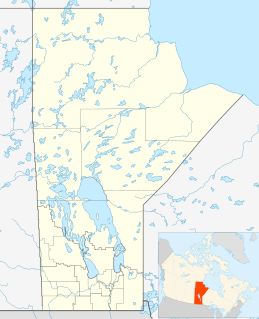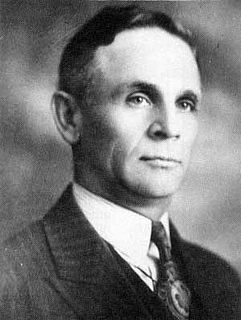Stanley William Fox (June 22, 1906-March 22, 1984) was a politician in Manitoba, Canada, who served as the first leader of the Manitoba Social Credit Party, a party that supported the social credit theories of monetary reform. [1]
A politician is a person active in party politics, or a person holding or seeking office in government. In democratic countries, politicians seek elective positions within a government through elections or, at times, temporary appointment to replace politicians who have died, resigned or have been otherwise removed from office. In non-democratic countries, they employ other means of reaching power through appointment, bribery, revolutions and war. Some politicians are experienced in the art or science of government. Politicians propose, support and create laws or policies that govern the land and, by extension, its people. Broadly speaking, a "politician" can be anyone who seeks to achieve political power in any bureaucratic institution.

Manitoba is a province at the longitudinal centre of Canada. It is often considered one of the three prairie provinces and is Canada's fifth-most populous province with its estimated 1.3 million people. Manitoba covers 649,950 square kilometres (250,900 sq mi) with a widely varied landscape, stretching from the northern oceanic coastline to the southern border with the United States. The province is bordered by the provinces of Ontario to the east and Saskatchewan to the west, the territories of Nunavut to the north, and Northwest Territories to the northwest, and the U.S. states of North Dakota and Minnesota to the south.

Canada is a country in the northern part of North America. Its ten provinces and three territories extend from the Atlantic to the Pacific and northward into the Arctic Ocean, covering 9.98 million square kilometres, making it the world's second-largest country by total area. Canada's southern border with the United States is the world's longest bi-national land border. Its capital is Ottawa, and its three largest metropolitan areas are Toronto, Montreal, and Vancouver. As a whole, Canada is sparsely populated, the majority of its land area being dominated by forest and tundra. Consequently, its population is highly urbanized, with over 80 percent of its inhabitants concentrated in large and medium-sized cities, many near the southern border. Canada's climate varies widely across its vast area, ranging from arctic weather in the north, to hot summers in the southern regions, with four distinct seasons.
The son of Thomas A. Fox and Flora McQuarrie, [2] Fox was born in Balmoral, Manitoba. He was educated at the University of Manitoba and the Manitoba Medical College. He subsequently practiced as a doctor. [3] He reached the rank of Captain in the Canadian Army Medical Corps. [2]

Balmoral is an unincorporated village north of Winnipeg located within the boundaries of the Rural Municipality of Rockwood, Manitoba.
The University of Manitoba is a public research university in Manitoba, Canada. Its main campus is located in the Fort Garry neighbourhood of southern Winnipeg with other campuses throughout the city. Founded in 1877, it is Western Canada's first university. The university maintains a reputation as a top research-intensive post-secondary educational institution and conducts more research annually than any other university in the region.
In Manitoba's 1936 provincial election, Fox was elected as a Social Credit candidate in the riding of Gilbert Plains. [1] The newly formed party did not have a leader during the election, and Fox was subsequently chosen to head its parliamentary caucus. [4]

Gilbert Plains is an unincorporated urban community in the Gilbert Plains Municipality within the Canadian province of Manitoba that held town status prior to January 1, 2015. It is located on Highway 5 and the CN railway line, between Dauphin and Grandview. It is approximately 250 miles northwest of Winnipeg. Gilbert Plains railway station receives Via Rail service. The local newspaper, The Exponent, services both Gilbert Plains and its neighboring town, Grandview.
Soon after being chosen as leader, Fox offered to support the government of Liberal-Progressive Premier John Bracken, who had been reduced to a minority and was unable to find allies elsewhere. There were some discussions for a formal coalition, but these came to nothing, and Social Credit supported the minority government from the outside until 1940. [3]

The Manitoba Liberal Party is a political party in Manitoba, Canada. Its roots can be traced to the late nineteenth-century, following the province's creation in 1870.

John Bracken, was an agronomist, the 11th and longest-serving Premier of Manitoba (1922–1943) and leader of the Progressive Conservative Party of Canada (1942–1948).
A minority government, or minority cabinet or minority parliament, is a cabinet formed in a parliamentary system when a political party or coalition of parties does not have a majority of overall seats in the parliament. It is sworn into office, with or without the formal support of other parties, to enable a government to be formed. Under such a government, legislation can only be passed with the support of enough other members of the legislature to provide a majority, encouraging multi-partisanship. In bicameral parliaments, the term relates to the situation in chamber whose confidence is considered most crucial to the continuance in office of the government.
Fox stepped down as the party's parliamentary leader in 1937, in favour of S.E. Rogers. He supported Social Credit's decision to join the government in 1940, and was re-elected in 1941 and 1945. [1]
In 1937, Fox was charged with performing an illegal operation on Miss Alice Bosnell. However, charges were dropped because Bosnell, married to Dr. Fox earlier that year, could not be compelled to testify against her husband. [5]
Fox planned to run for re-election in the 1949 campaign, but lost the coalition nomination to Ray Mitchell of the Liberal-Progressive Party.[ citation needed ] He did not return to political life afterwards, and died on March 22, 1984.
